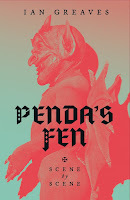Penda’s Fen Scene by Scene, by Ian Greaves
 This is an impressively detailed, close analysis of compellingly nuts and unsettling TV film Penda’s Fen, originally broadcast on BBC-1 on the evening of 21 March 1974.
This is an impressively detailed, close analysis of compellingly nuts and unsettling TV film Penda’s Fen, originally broadcast on BBC-1 on the evening of 21 March 1974. Ian Greaves — a friend for decades and now a stablemate at Ten Acre Books — devotes a chapter to each of the 27 scenes in the play, in order. He carefully compares different drafts of script and other sources, with new testimony from cast and crew. Many of these chapters are followed by ‘Interludes’ that explore a topic in further depth — for example, the role of Sir Edward Elgar and his music, the history of one of Rudkin’s other plays (for radio), or biographies of leading figures in the cast and crew.
Of the latter, I was blown away by the extraordinary life and output of producer David Rose. I’ve often seen his name attached to compelling works of drama but Ian lays out how brilliant he was at facilitating good work from others.
“In every anecdote about him, the wording and circumstances may vary, but they each tell the same story — of his light touch, his willingness to delegate, to enable good work, and above all to trust and empower those around him” (p. 123)
What an epitaph!
The scene-by-scene analysis so brilliantly done, full of top facts and smart insight. Then the last chapter, on the context of transmission, is a revelation.
How extraordinary to see this weird film in the context of the otherwise mundane TV that day or broadcast, in the context of the oil crisis, in the context of everything else. We understand what Penda’s Fen is and its impacts, the mixed reactions to it at the time and after, by knowing what it sat amidst in the schedule and in people’s lives.
Ian then continue this, to cover repeat screenings and the sharing of the play on video among jitter-fingered fans. So often, analysis of a particular TV programme or film sees its subject as a discreet unit, cut off from context. A film of this sort gets labelled as “folk horror” and bracketed with other stuff of what is seen as a similar type. But that excises what made this so strange and jarring: it wasn’t like anything around it. By wading into that context, Ian makes Penda's Fen even more odd and interesting.
I read the book a little guiltily, as it’s unrelated to the huge heap of work I need to get done on my forthcoming biography of Terrance Dicks (who was at the time that Penda’s Fen was first broadcast just coming to the end of his full-time job with the BBC as script editor of Doctor Who). And yet there are overlaps here.
For example, on p. 151 Ian identifies two special effects shots in the play as the work of Bernard Lodge, who got the job in September 1973 and applied made use of his own version of the ‘slit scan’ technique from the end of Kubrick’s 2001: A Space Odyssey. Of course, this was at just the same time that Lodge was also using the same technique to create the new opening title sequence for Doctor Who.
That prompted me to look at the transmission of Penda’s Fen in the context of Doctor Who. Of no interest to anyone but me, it went out in the week between Part Four of Death to the Daleks and Part One of The Monster of Peladon. That was also the week in which the novelisations Doctor Who and the Doomsday Weapon and Doctor Who and the Day of the Daleks were meant to be published; the archive of the Official Doctor Who Fan Club of the time suggests that both books were delayed until July.
One of the things Ian discusses in the book is that Penda’s Fen was never expected to be repeated; viewers would have to make up their minds about its strange, opaque meanings from a single viewing. That’s true of those working on Doctor Who in the same period. These things are, quite by accident beyond the cast and crew, ephemera that has endured for half a century now, while so much of the stuff around it has long faded.
Simon Guerrier's Blog
- Simon Guerrier's profile
- 60 followers



